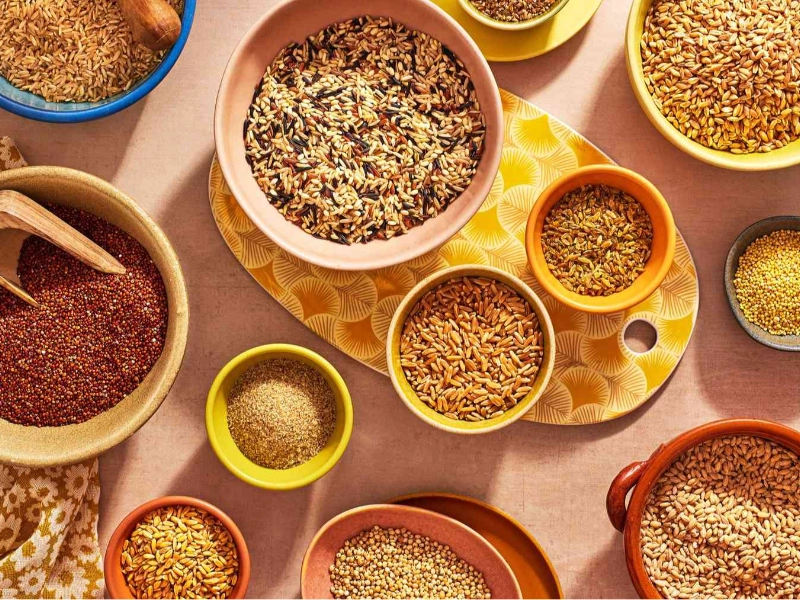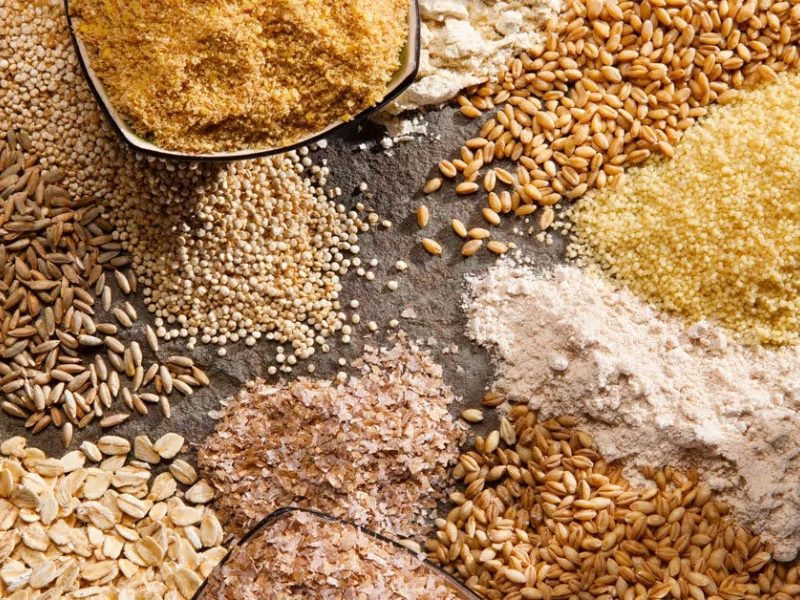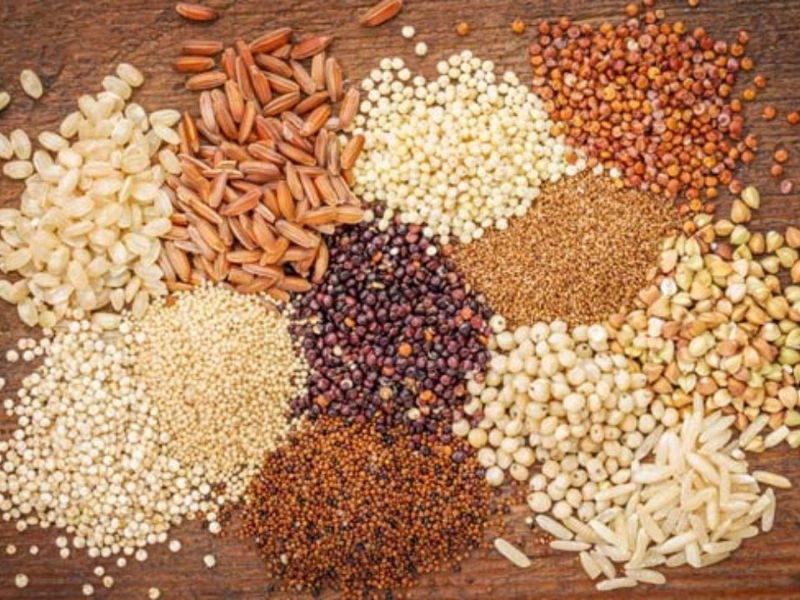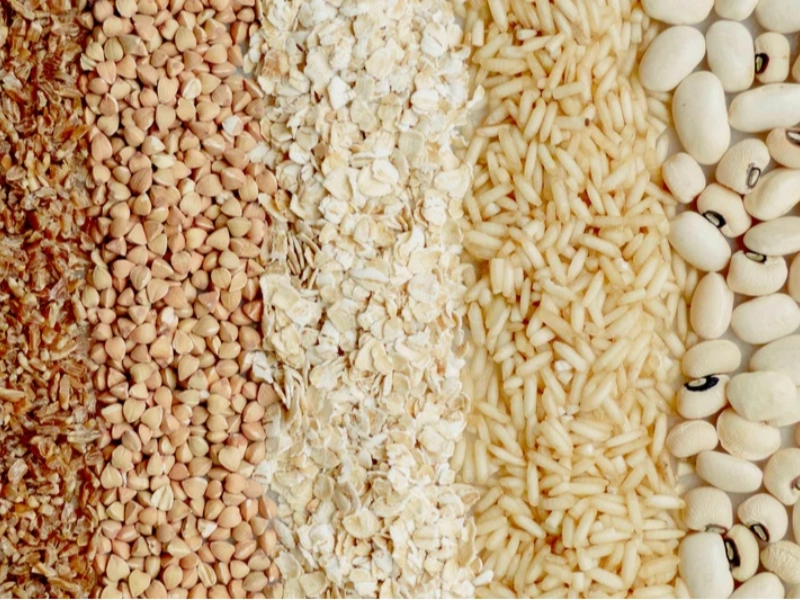Advertisement

Advertisement
1. Why Athletes Need Carbohydrates For athletes, carbohydrates are a fundamental macronutrient since they provide the main energy source during physical exercise. Maintaining ideal energy levels is crucial for athletes participating in rigorous training or competition if they are to perform and last. Particularly complex carbs offer athletes' perfect choice since they release consistent energy. Including whole grains in an athlete's diet will improve performance, recuperation, and general health noticeably.
2. Knowing Complex Carbohydrates Longer chains of sugar molecules form complex carbohydrates, which the body breaks down and uses more slowly. This slow breakdown releases glucose into the bloodstream gradually, therefore supplying a consistent source of energy. Complex carbs abound in whole grains including brown rice, quinoa, oats, and whole wheat. Unlike simple carbohydrates, which can lead to quick increases in blood sugar followed by crashes, complex carbohydrates enable athletes during extended exercises maintain steady energy levels—which are absolutely vital.

3. How Whole Grains Might Improve Athletic Performance Athletes would gain much from whole grains. Rich in vitamins, minerals, and dietary fiber—all of which support general health—they are also Whole grains' fibre helps control blood sugar levels and facilitates digestion, therefore averting energy dumps. Whole grains also abound in antioxidants that help lower inflammation and muscular discomfort following demanding exercise. Including whole grains in an athlete's diet will help them to perform better, heal more quickly, and increase endurance.
4. Time Your Carbohydrates Intake For athletes, timing carbohydrate intake is equally crucial as the kind of carbs they eat. Before exercise, eating complex carbohydrates will supply the energy needed for best performance. About two to three hours before an exercise, a meal high in whole grains will efficiently fuel the body. Recovering after an exercise requires sophisticated glucose replenishment of glycogen levels. Combining whole grains with protein following a workout helps muscles heal and recover even more.
5. selecting the correct grains Regarding athletic performance, not every grain is made equal. Athletes should concentrate on whole grains with the most nutritious value. Rich in complex carbs, options include quinoa, brown rice, barley, and farro also provide minerals, fibre, and vital amino acids. For athletes trying to develop and heal muscle, quinoa is a great source of complete protein. By varying grains, meals can become more interesting and performance can be optimised.

6. Water and Whole Grains Another important component of athletic performance is hydration, hence whole grains can help to preserve appropriate levels of hydration. Many whole grains have a lot of water, which can help to balance fluid consumption generally. Whole grains' fibre also helps control bodily water absorption, so encouraging improved hydration. Peak performance depends on being properly hydrated, hence include whole grains into meals helps to achieve this aim.
7. Meal Plans for Sportsmen Making meals with healthy grains can be tasty as well as nouraging. For a nutritious breakfast, athletes could start their day with muesli topped with nuts and fruits. A quinoa salad including lean protein and veggies is a filling and energising lunch choice. Dinner might be brown rice topped with steamed vegetables and grilled chicken. Another rapid energy boost between meals is from whole grain crackers or rice cakes.
8. How Fibre Affects Performance Though it's not typically included in conversations on athletic performance, fibre is absolutely essential for an athlete's diet. Whole grains' fibre aids in digestion and preserves a good gut flora. A digestive system that is in good working order can improve nutrition absorption, therefore guaranteeing that athletes get the minerals and vitamins required for best performance. Furthermore, fibre can control appetite, therefore limiting overindulgence and maintaining steady energy levels.

9. Typical Stories About Carbohydrates Though carbohydrates are vital for athletes, their intake is surrounded in numerous questions. Some sportsmen could think that eliminating carbohydrates will improve performance or help with weight loss. This strategy, meanwhile, can result in lower energy levels, worse performance, and slower recovery times. Athletes must realise that their bodies depend on carbohydrates—especially complex carbs from whole grains—which also assist their training programs.
10. Athletic Performance's Grains' Summary Athletes trying to maximise their performance via diet will find great value in whole grains. Packed in minerals, vitamins, and complex carbs, they boost general health, aid in recovery, and offer continuous energy. Athletes that include a range of whole grains into their meals will improve their performance, keep steady energy levels, and guarantee appropriate recovery. A wise approach for reaching optimal performance and long-term health is to make whole grains a mainstay of an athlete's diet.

 3. How Whole Grains Might Improve Athletic Performance Athletes would gain much from whole grains. Rich in vitamins, minerals, and dietary fiber—all of which support general health—they are also Whole grains' fibre helps control blood sugar levels and facilitates digestion, therefore averting energy dumps. Whole grains also abound in antioxidants that help lower inflammation and muscular discomfort following demanding exercise. Including whole grains in an athlete's diet will help them to perform better, heal more quickly, and increase endurance.
4. Time Your Carbohydrates Intake For athletes, timing carbohydrate intake is equally crucial as the kind of carbs they eat. Before exercise, eating complex carbohydrates will supply the energy needed for best performance. About two to three hours before an exercise, a meal high in whole grains will efficiently fuel the body. Recovering after an exercise requires sophisticated glucose replenishment of glycogen levels. Combining whole grains with protein following a workout helps muscles heal and recover even more.
5. selecting the correct grains Regarding athletic performance, not every grain is made equal. Athletes should concentrate on whole grains with the most nutritious value. Rich in complex carbs, options include quinoa, brown rice, barley, and farro also provide minerals, fibre, and vital amino acids. For athletes trying to develop and heal muscle, quinoa is a great source of complete protein. By varying grains, meals can become more interesting and performance can be optimised.
3. How Whole Grains Might Improve Athletic Performance Athletes would gain much from whole grains. Rich in vitamins, minerals, and dietary fiber—all of which support general health—they are also Whole grains' fibre helps control blood sugar levels and facilitates digestion, therefore averting energy dumps. Whole grains also abound in antioxidants that help lower inflammation and muscular discomfort following demanding exercise. Including whole grains in an athlete's diet will help them to perform better, heal more quickly, and increase endurance.
4. Time Your Carbohydrates Intake For athletes, timing carbohydrate intake is equally crucial as the kind of carbs they eat. Before exercise, eating complex carbohydrates will supply the energy needed for best performance. About two to three hours before an exercise, a meal high in whole grains will efficiently fuel the body. Recovering after an exercise requires sophisticated glucose replenishment of glycogen levels. Combining whole grains with protein following a workout helps muscles heal and recover even more.
5. selecting the correct grains Regarding athletic performance, not every grain is made equal. Athletes should concentrate on whole grains with the most nutritious value. Rich in complex carbs, options include quinoa, brown rice, barley, and farro also provide minerals, fibre, and vital amino acids. For athletes trying to develop and heal muscle, quinoa is a great source of complete protein. By varying grains, meals can become more interesting and performance can be optimised.
 6. Water and Whole Grains Another important component of athletic performance is hydration, hence whole grains can help to preserve appropriate levels of hydration. Many whole grains have a lot of water, which can help to balance fluid consumption generally. Whole grains' fibre also helps control bodily water absorption, so encouraging improved hydration. Peak performance depends on being properly hydrated, hence include whole grains into meals helps to achieve this aim.
7. Meal Plans for Sportsmen Making meals with healthy grains can be tasty as well as nouraging. For a nutritious breakfast, athletes could start their day with muesli topped with nuts and fruits. A quinoa salad including lean protein and veggies is a filling and energising lunch choice. Dinner might be brown rice topped with steamed vegetables and grilled chicken. Another rapid energy boost between meals is from whole grain crackers or rice cakes.
8. How Fibre Affects Performance Though it's not typically included in conversations on athletic performance, fibre is absolutely essential for an athlete's diet. Whole grains' fibre aids in digestion and preserves a good gut flora. A digestive system that is in good working order can improve nutrition absorption, therefore guaranteeing that athletes get the minerals and vitamins required for best performance. Furthermore, fibre can control appetite, therefore limiting overindulgence and maintaining steady energy levels.
6. Water and Whole Grains Another important component of athletic performance is hydration, hence whole grains can help to preserve appropriate levels of hydration. Many whole grains have a lot of water, which can help to balance fluid consumption generally. Whole grains' fibre also helps control bodily water absorption, so encouraging improved hydration. Peak performance depends on being properly hydrated, hence include whole grains into meals helps to achieve this aim.
7. Meal Plans for Sportsmen Making meals with healthy grains can be tasty as well as nouraging. For a nutritious breakfast, athletes could start their day with muesli topped with nuts and fruits. A quinoa salad including lean protein and veggies is a filling and energising lunch choice. Dinner might be brown rice topped with steamed vegetables and grilled chicken. Another rapid energy boost between meals is from whole grain crackers or rice cakes.
8. How Fibre Affects Performance Though it's not typically included in conversations on athletic performance, fibre is absolutely essential for an athlete's diet. Whole grains' fibre aids in digestion and preserves a good gut flora. A digestive system that is in good working order can improve nutrition absorption, therefore guaranteeing that athletes get the minerals and vitamins required for best performance. Furthermore, fibre can control appetite, therefore limiting overindulgence and maintaining steady energy levels.
 9. Typical Stories About Carbohydrates Though carbohydrates are vital for athletes, their intake is surrounded in numerous questions. Some sportsmen could think that eliminating carbohydrates will improve performance or help with weight loss. This strategy, meanwhile, can result in lower energy levels, worse performance, and slower recovery times. Athletes must realise that their bodies depend on carbohydrates—especially complex carbs from whole grains—which also assist their training programs.
10. Athletic Performance's Grains' Summary Athletes trying to maximise their performance via diet will find great value in whole grains. Packed in minerals, vitamins, and complex carbs, they boost general health, aid in recovery, and offer continuous energy. Athletes that include a range of whole grains into their meals will improve their performance, keep steady energy levels, and guarantee appropriate recovery. A wise approach for reaching optimal performance and long-term health is to make whole grains a mainstay of an athlete's diet.
9. Typical Stories About Carbohydrates Though carbohydrates are vital for athletes, their intake is surrounded in numerous questions. Some sportsmen could think that eliminating carbohydrates will improve performance or help with weight loss. This strategy, meanwhile, can result in lower energy levels, worse performance, and slower recovery times. Athletes must realise that their bodies depend on carbohydrates—especially complex carbs from whole grains—which also assist their training programs.
10. Athletic Performance's Grains' Summary Athletes trying to maximise their performance via diet will find great value in whole grains. Packed in minerals, vitamins, and complex carbs, they boost general health, aid in recovery, and offer continuous energy. Athletes that include a range of whole grains into their meals will improve their performance, keep steady energy levels, and guarantee appropriate recovery. A wise approach for reaching optimal performance and long-term health is to make whole grains a mainstay of an athlete's diet.